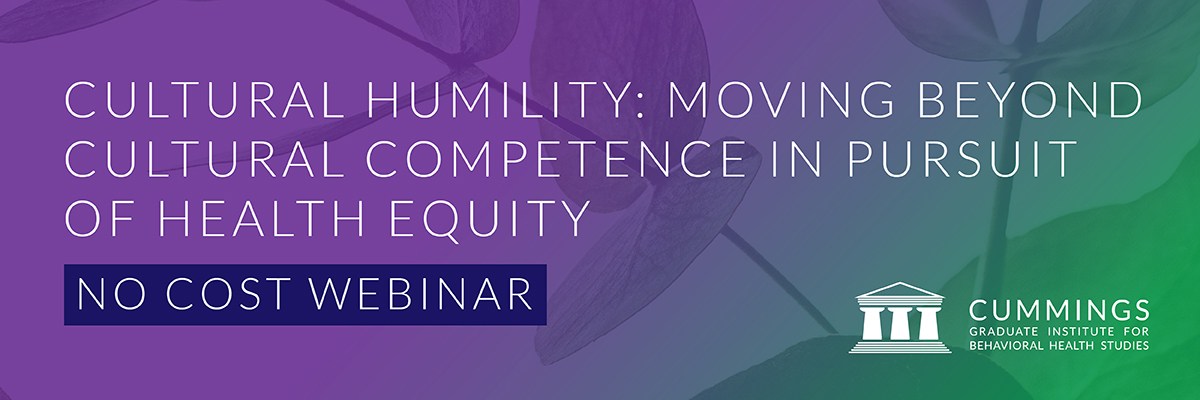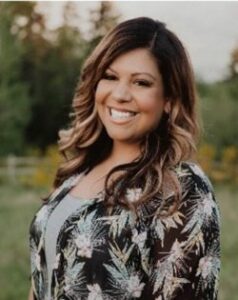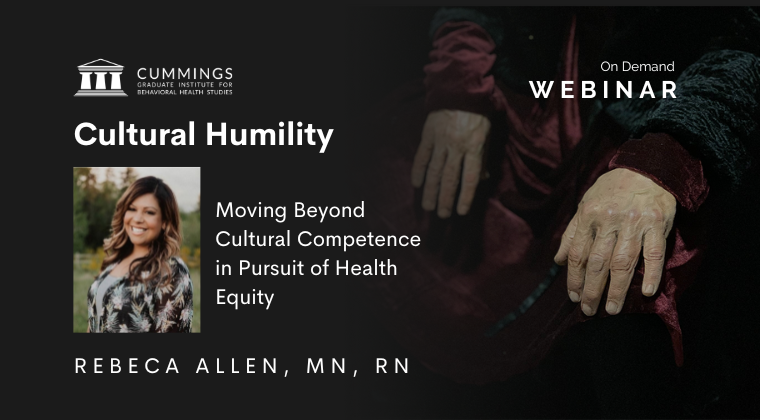 Cummings Graduate Institute for Behavioral Health Studies (CGI) proudly offers the Cultural Humility: Moving Beyond Cultural Competence in Pursuit of Health Equity webinar at no cost to mental health providers, supervisors, and directors, designed and facilitated by Rebeca Allen, MN, RN. In this webinar we will reveal practical steps to reduce biases that can be implemented in everyday encounters with patients as we continue to strive for health equity.
Cummings Graduate Institute for Behavioral Health Studies (CGI) proudly offers the Cultural Humility: Moving Beyond Cultural Competence in Pursuit of Health Equity webinar at no cost to mental health providers, supervisors, and directors, designed and facilitated by Rebeca Allen, MN, RN. In this webinar we will reveal practical steps to reduce biases that can be implemented in everyday encounters with patients as we continue to strive for health equity.
This webinar is available at no-cost, online, on-demand training courses.
Register for the no cost webinar
About the Webinar
Cultural Humility: Moving Beyond Cultural Competence in Pursuit of Health Equity Webinar
Webinar Description
We all have biases.
As healthcare professionals we are being called to action to address biases in order to have a more equitable healthcare system. It can feel daunting, overwhelming and burdensome to have to yet learn another thing in the fast-moving, ever-changing world of healthcare (Hello COVID!). Cultural Humility is a process that is explored in this webinar to help facilitate our everyday interactions with the diverse communities that we serve. In this webinar we will reveal practical steps to reduce biases that can be implemented in everyday encounters with patients as we continue to strive for health equity.
Learning Objectives
- Identify the importance of implementing Cultural Humility
- Identify the difference between cultural humility and cultural competence
- Identify steps to implement cultural humility within their practice
Learn more about the Cultural Humility: Moving Beyond Cultural Competence in Pursuit of Health Equity webinar: click here.
Audience
This webinar is designed for:
- LCSW
- LPC
- LMFT
- Clinical Supervisors
- Clinical Directors
- Program Supervisors
- Program Directors
- DBH
- MSW
Focus of Study:
Cultural competence, diversity
Content Level
Intermediate
CE Credit Approvals
- This webinar does not qualify for sponsored continuing education credit.
- A certificate of attendance will be issued for completing this webinar.
Cost
Cost: $0 USD
Course delivery
Online, on-demand
Interaction
Asynchronous, Non-Interactive
Sign-up for the webinar
Empty heading
 About the Facilitator, Rebeca Allen, MN, RN
About the Facilitator, Rebeca Allen, MN, RN
“This webinar brings awareness to the importance of addressing biases in our healthcare system that contribute to health disparities disproportionately impacting BIPOC communities. Learners will gain knowledge of practical action steps that can be implemented in day-to-day patient interactions to minimize the harm biases can cause and improve patient care.” – Rebeca Allen, MN, RN.
Rebeca Allen has been a nurse for 15 years. She transitioned from working at the bedside to a full-time Nurse Educator in 2020. Her experience as a nurse includes working in acute care areas, including the ER and ICU. In her journey from being a nurse at the bedside to now a nurse educator, she has developed a passion for diversity, equity, and inclusion in healthcare and education.
As an immigrant Latina woman, she has a desire to bring more awareness of health disparities in historically marginalized communities. She is committed to creating action steps in developing a more anti-racist healthcare system that eliminates health disparities. She is also passionate about providing both students and patients with the tools to empower them to reach their highest potential.
Continuing Education Accreditation
This webinar does not qualify for sponsored continuing education credit
About Continuing Education at CGI
Accommodations: All videos are closed-captioned. Individuals needing other accommodations should contact continuinged@cgi.edu or call (480) 285-1761, ext. 3
Grievances: To alert us to a problem or concern, please complete a Grievance Form. We value your input and hope to resolve any issues in a timely manner.
Refunds: Your satisfaction is important. However, we have a no refund policy. By using and or purchasing our program, you understand and agree all sales are final.
To explore CGI’s full catalog of continuing education offerings, visit: https://cgi.thinkific.com
Sign-up for our continuing education newsletter to learn about new offerings.
Questions
Questions about webinars and continuing education offerings at CGI can be directed to continuinged@cgi.edu.































